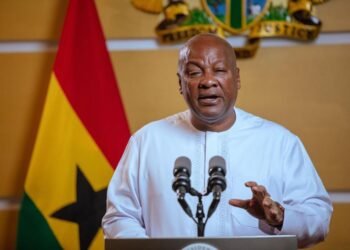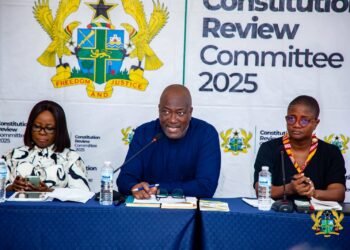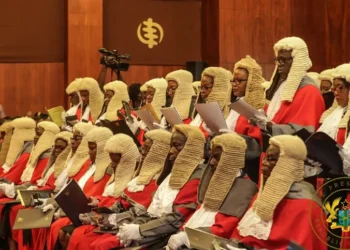The Honorary Vice President of IMANI Centre for Policy and Education, Bright Simons, has expressed significant doubt over Ghana’s ability to recover even a fraction of the alleged $21 billion in state funds reportedly misappropriated under the previous administration.
In a series of posts, Bright Simons meticulously dissected the challenges surrounding the government’s Operation Recover All Loot (ORAL) initiative, questioning both its feasibility and the commitment of the Attorney General to its execution.
According to him, the ambitious target of recovering 12.5% of the alleged loot—approximately $2.6 billion—is a stretch, given the nature of the financial irregularities highlighted in the ORAL report.
He argued that a substantial portion of the so-called “loot” comprises fiscal mismanagement rather than tangible funds stashed away in recoverable accounts.
“Think about the $4.5bn said to have been ‘illegally printed’ by the Governor of the central bank, for instance. That money has been spent. The citizens have suffered from inflation. Full stop. Other categories involve hyper-projections across multiple time ranges.
‘Think of the $4.5 billion National Service Scheme “fraud”. Note that $4.5bn is about 50% of the entire national budget. That money could not have been spent within the time period in question”.
Bright Simons, Honorary Vice President of IMANI Centre for Policy and Education
Bright Simons further pointed out that payments for luxury presidential jet rentals were made through classified financial channels, making them nearly impossible to audit and retrieve.
On COVID-19 Expenditures, the IMANI Honorary Vice President, Bright Simons, contended that the $1.5 billion spent on social welfare programs during the pandemic was largely authorised by parliamentary appropriation, limiting the possibility of clawing back substantial amounts.
For him, collectively, these four categories alone amount to over 50% of the total ORAL estimate of the loot, making even the 12.5% recovery target extremely difficult to achieve.
A Call for Greater Accountability
Bright Simons did not merely highlight the challenges but also issued a strong call for scrutiny of the Attorney General’s role in the asset recovery process.
He warned that unless the Attorney General is subjected to rigorous oversight, even a minimal fraction of the targeted $2.6 billion may not be recovered by the end of the current administration’s term.
Furthermore, Bright Simons stressed the need for a transparent cost analysis of the ORAL policy itself, asserting that if the infrastructure required for investigations, prosecutions, and asset recovery costs $26 million, then a recovery rate of only $2.6 million would mean the initiative would be a net loss for the country.
“Is that unfair to the Attorney General? Seeing as he doesn’t control the courts? Well, there is no policy situation where every element is controlled by political leaders.
“Effective ORAL prosecutions and recovery are dependent on top-notch investigations, the ability to inspire whistle-blowers and others with information to step up, and solid courtroom work. All of those are perfectly within the control of the Attorney General.”
Bright Simons, Honorary Vice President of IMANI Centre for Policy and Education

Beyond Legal Actions: A Structural Approach
Bright Simons argued that effective asset recovery is not solely dependent on legal prosecutions but also on the political will to dismantle ongoing schemes that continue to drain state resources.
He pointed out that many of the allegedly looted funds have been absorbed into permanent state programs that remain active today.
“If the President really wants to recover billions of dollars of loot, then he needs to ‘shine his eye’ and stop his appointees from simply ROLLING OVER these ‘state enchantment’ scams and schemes to new cronies and schemers”.
Bright Simons, Honorary Vice President of IMANI Centre for Policy and Education
He referenced examples such as e-gates, Immigration360, and the Common Platform at the Ministry of Communications as well-documented money-wasting initiatives that could continue under the guise of new operators if not properly scrutinised.
Bright Simons proposed that government initiatives like ORAL should be structured with clear, measurable outcomes.
He suggested that the Attorney General’s performance should be assessed based on specific targets, including a 50% prosecution rate, a 50% conviction rate, and a 50% recovery rate of misappropriated funds.
This would translate into at least 1,200 prosecutions, 600 successful convictions, and the retrieval of at least $2.6 billion.
He further emphasised that the Attorney General should be required to provide regular public briefings on the progress of ORAL-related cases, ensuring transparency and accountability.
Beyond governmental action, Bright Simons urged citizens to apply sustained pressure on political leaders to ensure that fraudulent schemes are dismantled.
He emphasised that without vigilant public scrutiny, the government might simply replace old players with new ones while allowing wasteful spending to persist.
“We spent the last seven years or so documenting many of these schemes. Maybe, just maybe, citizens can also try to keep the heat on to ensure that the politicians have the incentive to unravel these schemes and stop the national bleeding”.
Bright Simons, Honorary Vice President of IMANI Centre for Policy and Education
Bright Simons’ analysis presents a sobering reality check on the ORAL initiative. His critique suggests that without structural changes, rigorous oversight of the Attorney General, and active public engagement, the government’s recovery efforts may fall woefully short.
READ ALSO: Gov’t-IMF Talks Focus on Tax Reforms, Energy Debt, and Cedi Stability























